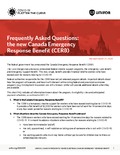News
March 30, 2020
Newly Announced Canadian Emergency Response Benefit (CERB)
Please find below the Unifor's Frequently Asked Questions: the new
Canadian Response Benefit (CERB).
Members will find this document, along with other COVID-19 resources and information, on the
unifor.org website under the COVID-19- Update link.
The federal government has announced the Canada Emergency Response Benefit (CERB).
The CERB merges two previously announced federal income support programs, the Emergency Care Benefit and Emergency Support Benefit. This new, single, benefit provides financial relief to workers who have ceased work for reasons relating to COVID-19.
Federal authorities responsible for the CERB have not yet released program details. Important details about how the program will operate, and how it will intersect with existing federal and provincial assistance programs (e.g. Employment Insurance), are still unknown. Unifor will provide additional details when they are available.
This short FAQ includes all information known about the program, its eligibility rules and anticipated payment schedules, as outlined in Bill C-13.
1. What is the Canada Emergency Response Benefit?
The CERB is a temporary income support for workers who have ceased working due to COVID-19. It provides a at bene t of $2,000 for workers who have been out of work for 14 consecutive days in any four-week period for reasons relating to COVID-19.
2. What situations does the Canada Emergency Response Benefit address?
The CERB covers workers who have ceased working for 14 consecutive days for reasons related to COVID-19. It is meant to address situations where workers, for reasons relating to COVID-19:
- Have been terminated or laid off;
- Are sick, quarantined, in self-isolation or taking care of someone who is sick with COVID-19;
or
- Are working parents who must stay home without pay to care for children due to illness or school/daycare closures.
- The CERB applies to wage earners, including contract workers and self-employed individuals regardless of their eligibility for Employment Insurance (EI).
3. Am I eligible for CERB benefits?
To qualify for CERB benefits, applicants must (a) be a resident of Canada, (b) be 15 years or older, and (c) have had a total income of at least $5,000 (combined) in 2019 or in the 12 months immediately preceding the application, from any of the following sources:
- Employment income;
- Self-employment income; and
- Maternity or parental leave benefits.
Additionally, to be eligible for the CERB benefit, a worker must receive no income for 14 consecutive days in a 4-week period for which they apply for benefits. This means no income from:
- Employment or self-employment;
- Employment Insurance;
- Any allowances/money/benefits in respect of pregnancy or parental leave, including adoption; or
- Any other income prescribed by regulation, no regulations have been passed to date.
4. How much will I get?
The CERB will pay out $2,000 per four week period, to a maximum of 16 weeks. The same $2,000 amount will be paid to all recipients.
5. Is the CERB a taxable benefit?
The CERB is a taxable bene t, but the Government has announced that tax recovery will be deferred. Further details are unavailable at this time.
6. How will I be paid under the CERB?
The CERB will be paid every four weeks, and be available from March 15, 2020 until October 3, 2020.
7. Where can I apply?
The benefit application process is not specified in the Act. The Government has announced that an online portal and telephone line will be available sometime during the week of April 6, and benefit claims will take 10 days to process.
8. I have already applied for EI, what do I do?
If you have already applied for EI, you do not need to apply for this new benefit. Your claim will automatically be processed under the CERB once the system is in place in early April.
9. I haven’t yet applied for EI or the CERB, what should I do?
Currently, we believe it is most advantageous for EI eligible workers to apply directly to EI, and not wait for the CERB application process to come online. We believe this will better assist workers who are eligible for both the CERB and EI, and who will expect to receive EI benefits after receiving the 16 allowed weeks of CERB benefits.
If a worker is not eligible for EI, the only option available to them is to apply directly to the CERB when applications open.
10. Should I apply to both EI and the CERB?
No. At this point, there is no clear advantage for a worker to apply to both programs.
11. How do I apply directly for CERB payments?
The Canada Emergency Response Bene t will be accessible through a secure web portal starting in early April. Applicants will also be able to apply via an automated telephone line or via a toll-free number. Specific details are yet to be released.
12. When will I start receiving my CERB payments?
The application process is scheduled to begin during the week of April 6, 2020, and the Government has said money will ow quickly. Applications will be processed within 10 days from when an application form is submitted. Applications can be back-dated to March 15, 2020.
13. I am already receiving Employment Insurance benefits. Do I qualify for the CERB payments?
At this point, the answer is no. You will continue to receive your EI benefits. However, if your EI bene ts end before October 3, 2020, and if you meet the CERB eligibility criteria, and if you are still unable to return to work for reasons relating to COVID-19, you can apply to receive CERB benefits.
14. What if I am still sick or unemployed after October 3, 2020?
If you have enough EI insurable hours, you will still be able to access your normal EI benefits after the 16-week period covered by the CERB.
more News


